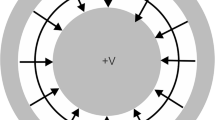Abstract
We present the bonding calculus, a calculus in which it is easy to handle covalent bonds between molecules. Our purpose is to use bonding calculus to model the dynamics of the interactions in biochemical systems. We provide an operational semantics by means of a transition system, and use a known software platform to both simulate the chemical reactions described naturally in bonding calculus and verify their specific properties.





Similar content being viewed by others
Explore related subjects
Discover the latest articles, news and stories from top researchers in related subjects.References
Avery OT, Goebel WF (1929) Chemoimmunological studies on conjugated carbohydrate-proteins: immunological specificity of synthetic sugar-protein antigens. J Exp Med 50:533–550
Behrmann G, David A, Larsen KG (2004) A tutorial on shape Uppaal. Lect Notes Comput Sci 3185:200–236
Bengtsson J, Yi W (2004) Timed automata: semantics, algorithms and tools. Lect Notes Comput Sci 3098:87–124
Cardelli L (2004) BioAmbients: an abstraction for biological compartments. Theor Comput Sci 325:141–167
Chabrier-Rivier N, Fages F, Soliman S (2004) The biochemical abstract machine BIOCHAM. Lect Notes Comput Sci 3082:172–191
Chari RV, Miller ML, Widdison WC (2014) Antibody-drug conjugates: an emerging concept in cancer therapy. Angew Chem Int Ed 53:3796–3827
Ciobanu G, Rozenberg G (eds) (2004) Modelling in molecular biology. Natural computing series. Springer, Berlin
Ciocchetta F, Hillston J (2008) Bio-PEPA: an extension of the process algebra PEPA for biochemical networks. Electron Notes Theor Comput Sci 194:103–117
Danos V, Feret J, Fontana W, Harmer R, Krivine J (2007) Rule-based modelling of cellular signalling. Lect Notes Comput Sci 4703:17–41
Diamantis N, Banerji U (2016) Antibody-drug conjugates-an emerging class of cancer treatment. Br J Cancer 114:362–367
Faeder JR, Blinov ML, Hlavacek WS (2009) Rule-based modeling of biochemical systems with BioNetGen. Methods Mol Biol 500:113–67
Gasparini R, Panatto D (2011) Meningococcal glycoconjugate vaccines. Hum Vaccines 7:170–182
Gao Y, Sun ZY, Huang ZH, Chen PG, Chen YX, Zhao YF, Li YM (2014) Covalent bond or noncovalent bond: a supramolecular strategy for the construction of chemically synthesized vaccines. Chem A Eur J 20:13541–13546
Gotschlich EC, Liu TY, Artenstein MS (1969) Human immunity to the meningococcus. J Exp Med 129:1349–1365
Klugman KP, Rodgers GL (2017) The future of paediatric pneumococcal conjugate vaccines. Lancet Respir Med 5:605–606
Kuhn S, Ulidowski I (2018) Local reversibility in a calculus of covalent bonding. Sci Comput Program 151:18–47
Lees A, Puvanesarajah V, Frasch C (2008) Conjugation Chemistry. In: Siber G, Klugman K, Mäkelä P (eds) Pneumococcal Vaccines. ASM Press, Washington, DC, pp 163–174
Milner R (1999) Communicating and mobile systems: the π-calculus. Cambridge University Press, Cambridge
Priami C (1995) Stochastic π-calculus. Comput J 38:578–589
Priami C, Quaglia P (2005) Beta binders for biological interactions. Lect Notes Bioinform 3082:20–33
Polakis P (2016) Antibody drug conjugates. Pharmacol Rev 68:3–19
Reddington SC, Howarth M (2015) Secrets of a covalent interaction for biomaterials and biotechnology: SpyTag and SpyCatcher. Curr Opin Chem Biol 29:94–99
Regev A, Shapiro E (2004) The π-calculus as an abstraction for biomolecular systems. In: Ciobanu G, Rozenberg G (eds) Modelling in molecular biology, Natural computing series. Springer, Berlin, pp 219–266
Schneerson R, Barrera O, Sutton A, Robbins JB (1980) Preparation, characterization, and immunogenicity of haemophilus influenzae type b polysaccharide-protein conjugates. J Exp Med 152:361–376
Slovin SF, Ragupathi G, Fernandez C, Jefferson MP, Diani M, Wilton AS, Powell S, Spassova M, Reis C, Clausen H, Danishefsky S, Livingston P, Scher HI (2005) A bivalent conjugate vaccine in the treatment of biochemically relapsed prostate cancer. Vaccine 23:3114–3122
Author information
Authors and Affiliations
Corresponding author
Rights and permissions
About this article
Cite this article
Aman, B., Ciobanu, G. Bonding calculus. Nat Comput 17, 823–832 (2018). https://doi.org/10.1007/s11047-018-9709-7
Published:
Issue Date:
DOI: https://doi.org/10.1007/s11047-018-9709-7




